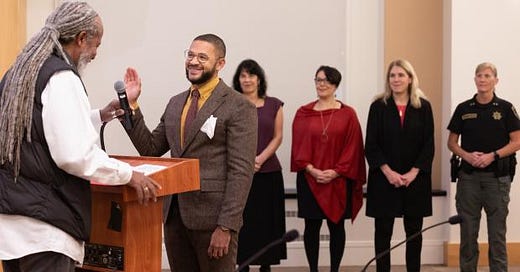Care, hope and government
Government works best when we try to figure out together how best to care for one another and how to live in ways that most closely approximate our hopes
“We usually don’t allow clapping in board meetings,” said Jessica Vega Pederson, chair of the Multnomah County Commission, “but we will make an exception.” In a sense, the exception had already been made; applause was washing over the room. It was November 16th, and Jesse Beason was being sworn in as interim Multnomah County Commissioner for District 2 to fill the slot vacated by Susheela Jayapal, who had declared her intent to run for Congress.
The applause was only part of what was exceptional about that November 16th meeting. The meeting room, for example, was standing room only, filled with friends and community partners of the incoming commissioner. The sometimes workaday or contentious vibe was replaced by eager anticipation. And everybody seemed to be smiling or brimming with happy tears. The words from ex-Commissioner Jayapal, Michael Alexander, Commissioner Beason, and the other commissioners were also exceptional; occasioned by Commissioner Beason’s swearing-in, they were less directed toward policies or tactics than usual and dwelled more in the orbit of care and hope.
Care and hope were front and center at this public meeting. Care and hope, not only spoken about but also felt – indisputably present in the room and the people who filled it.
I walked out of that room feeling grateful to have been there, and grateful to so many people who work with towns, cities, counties and other civic bodies – and put so much of their individual lives into making our shared lives better. I also walked out of that room wondering why this particular meeting felt exceptional, why so many public meetings and public spaces can today seem shy on care and hope and replete with other feelings, feelings like grievance, distrust, anger, blame, and fear.
As we near the end of a tough political year and step into what will almost certainly be an even more challenging year, I (like many other people) wonder what we can do, locally and nationally, to build more civic rooms that feel like that Thursday morning room.
Commissioner Beason closed his Thursday remarks with words from former Texas Congresswoman Barbara Jordan: “What the people want is simple,” he said, quoting Jordan. “They want an America as good as its promise.” This elegant link between our founding and our future is undoubtedly compelling, but at the same time, “promise” is a tough word – so many promises made and unkept, so much distance between what’s been promised and what is.
A promise is a declaration of intent, even the offer of a guarantee that that intent will be realized. But people, projects, officeholders, and circumstances change. Given how much space there is between a promise and its realization, I wonder if, in civic contexts, we might try in the coming year to foreground two things that are simpler than promise, namely care and hope. I wonder if, in planning and implementing any civic meeting, we could ask: What, in this situation and this gathering of people, does care look like? And what hopes might we share and work toward together?
Some might argue that politics is chiefly about power, not care – but this runs against both the motivations and self-understanding of the great majority of people who engage in civic and governmental work, especially at the local level, and against the words that just about all of them use to describe why they do what they do. Rule may be chiefly about power, but governance, especially in democratic and local contexts, is not.
Others might say that starting with and focusing on care and hope is dangerously naive, to which I would simply say that in this moment, regular and explicit reminders and re-dedications for ourselves and our neighbors could only be helpful. We are here at the county (or the city or the school or library board or Congress) to try and figure out together how best to care for one another and how to live in ways that most closely approximate our hopes. We know there are many perspectives in the room and that resources may be short – but let’s recognize that we’re all here because we care and because we have hopes for how our community might become stronger.
The experience of that November 16th meeting will stand, for me, as precisely this kind of reminder – and one that I want to broadcast and aspire to. Every day, all across Oregon and the country, there are so many mundane, bureaucratic civic meetings and processes. Beneath all of them is the attempt to care for one another and to live better together. Government, especially local government, is not and should not be seen to be fundamentally about power, money, or tribe. Care and hope are the underlying drivers, and reminding ourselves of this – as everyone who spoke at Commissioner Beason’s swearing-in did – will help us govern ourselves better and live better together.
When Commissioner Vega Pederson said “we’ll make an exception and allow applause,” she was acknowledging that there was something about that morning’s situation that was exceptional, that justified the break from protocol.
My question here at the end of this year and just before the start of next year is this: Could we make this exceptional situation the norm? Could we always begin these sorts of meetings, even when they don’t include the swearing-in of already-beloved community figures, by recognizing that we’re there because we care and because we hope – and could we also recognize that the people giving their lives to this necessarily challenging and collaborative work of care and hope deserve recognition, support, and perhaps even applause?





I guess I don't want to hear Sally Schott's New Year's resolutions, but I wish her well.......
Unadulterated claptrap and sap.